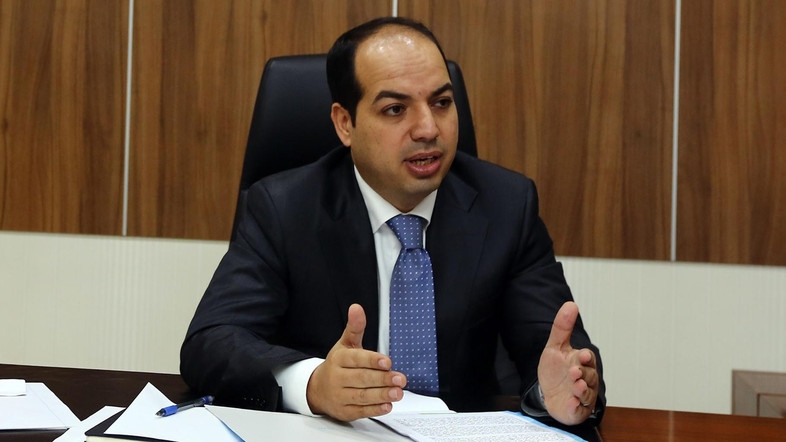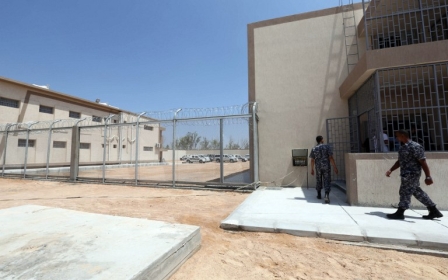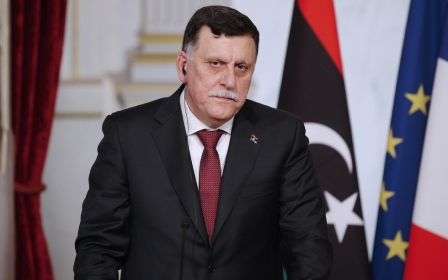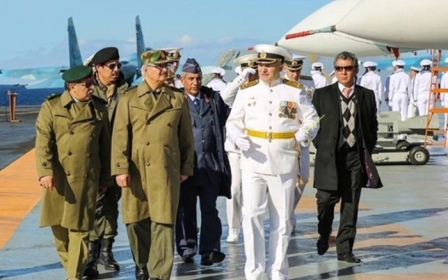Libya still needs the UN-backed government, says deputy PM

The deputy prime minister of Libya’s UN-backed Government of National Accord insists that despite major setbacks since the GNA's formation last year, it is the country’s only chance for peace.
The popularity of the GNA has suffered over the past few months as the body's promise of political unity in the divided country flopped, and conditions for Libya’s population have worsened. But Ahmed Maiteeq told Middle East Eye that the GNA is on course to resolve major problems such as the incorporation of militias and had successfully defeated the Islamic State group.
'It is very easy to start a war; it's hard to end one' - Ahmed Maiteeq, Libya's deputy prime minister
The GNA was formed in UN-sponsored peace talks between the country's major rival factions in December 2015, when Libya had two rival governments. Its purpose was to built a single unity government, however both of the former rival governments have continued to operate alongside the GNA despite the body entering Tripoli in March last year.
Blackouts, kidnappings, bank crisis
Months of 12-hour-long blackouts, a crippling bank crisis, and a wave of kidnappings in the capital have magnified criticisms that the GNA is a government that only exists on UN-headed paper.
Libyan general turns to Moscow for billions of dollars in support
“There are many forces that are trying to undermine us through the electricity and bank crises,” Deputy Prime Minister Maiteeq told Middle East eye in an interview in the prime ministry offices in central Tripoli. “But can you imagine what it would be like without the GNA? What would the future of the country be then?” he said.
‘GNC leader Khalifa Ghwell knows what he is doing, he is sending a message of failure but he won't succeed.'
Maiteeq claims that a group from the rump of the old General National Congress (GNC) are still trying to control the country from the capital, spoiling the chances for political resolution of the country's problems.
“Mr Khalifa Ghwell, their leader, knows what he is doing, he is sending a message of failure but he won't succeed.”
After the interview with MEE, Khalifa Ghwell and his armed bodyguards visited Maiteeq's house in Tripoli where an argument between the two men ensued – no shots were fired.
Struggle to build new state
When asked whether the GNA was salvageable given the continuing problems, Maiteeq staked much on the body's announcement earlier this month of an official budget under its control that the GNA's ministers claim will enable the body to govern more effectively.
“We have a new budget for 2017 and this will give us the power to change things – universities will be funded again for the first time in years – and those trying to handicap us will not succeed now we have a real budget,” Maiteeq told MEE.
US stealth bombers kill 80 IS militants in Libya
“The power of a government stems from three elements: money, an army, and the media and we're working on getting all three. We have the money now and once we have the rest many problems will disappear,” he said.
“There are many hurdles to leap but this budget will help every Libyan.”
Libya's capital is dominated by organised well-armed militias, making it difficult to imagine effective civilian government taking hold. In eastern Libya, where part of the Libyan armed forces loyal to General Khalifa Haftar are strong, many claim that militias from the city of Misrata in particular are too powerful in Tripoli.
'No one is looking for militias to protect and control the nation, this is very clear, and Haftar is just a militiaman with good propaganda'
“One of our biggest problems is dealing with armed groups, not just from Misrata but all over the country,” said Maiteeq, who is himself from Misrata. “But we will slowly absorb these armed groups; we have sent them a message that they can be reincorporated into the legitimate government.”
Maiteeq claims that the continuation of both the political and infrastructural crises in Libya are predictable consequences of the effort to build a new state and should not be treated as evidence of the GNA's failure.
“Always when you have a new state many institutions do not function, and when you take measures to put things on track in the short term people feel more pain,” he told MEE.
“However we have had some victories: the roads are now open and you can travel from Tripoli to Benghazi by bus – not long ago Islamic State were here and now they're gone, we were successful in our fight against Islamic State.”
Threats of war
In the east of Libya, political and armed factions have been increasingly uniting behind General Khalifa Haftar, whose Libyan National Army (LNA) forces recently took control of the Gulf of Sirte oil reserves leading to talk of a coming clash between Haftar’s forces and the western Libyan militias.
Maiteeq brushed off claims that Haftar's forces are growing in strength or popularity. “I don't think Haftar has an army; he has some militias under his umbrella, but more than 70 percent of the Libyan army is in the west,” he told MEE.
“No one is looking for militias to protect and control the nation, this is very clear, and Haftar is just a militiaman with good propaganda.”
There are few inside Libya who would claim that the GNA has been a success, and calls to amend the Libyan Political Agreement (LPA) that formed the government are multiplying, as are the number of problems political forces in the country face – from economic crises to the threat of another round of fighting in the capital.
“We are part of this world and the GNA, a unified government that works with the rest of the world, is the only chance for peace and for Libya,” Maiteeq said. “It is very easy to start a war; it's hard to end one.”
New MEE newsletter: Jerusalem Dispatch
Sign up to get the latest insights and analysis on Israel-Palestine, alongside Turkey Unpacked and other MEE newsletters
Middle East Eye delivers independent and unrivalled coverage and analysis of the Middle East, North Africa and beyond. To learn more about republishing this content and the associated fees, please fill out this form. More about MEE can be found here.




